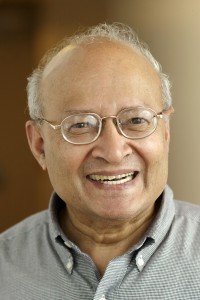 THOMAS KAILATH, professor emeritus of electrical engineering, has won the BBVA Foundation Frontiers of Knowledge Award in Information and Communication Technologies.
THOMAS KAILATH, professor emeritus of electrical engineering, has won the BBVA Foundation Frontiers of Knowledge Award in Information and Communication Technologies.
In honoring Kailath with the prestigious award, the foundation described him as the author of a mathematical development enabling the production of increasingly small computing chips.
“Methods of his invention are able to pattern integrated circuits with components finer even than the light waves used in their production, rather like drawing a line that is finer than the point of the pencil,” the foundation said in its announcement. “This discovery, moreover, emerged at a time when the limits of chip miniaturization seemed close and insurmountable.”
In the field of wireless communication, Kailath’s work led to the development of a new antenna system used in now-ubiquitous Wi-Fi technology, and was also instrumental in bringing to market the GSM cell phone standard.
Kailath, the Hitachi America Professor in the School of Engineering, Emeritus, was cited as “that rare combination: a scientist with the ability to solve profound mathematical problems and translate them into practical applications, generating new technologies and transferring them to industry.”
In an interview with the foundation, Kailath predicted that “cell phones will get better and better, with more computing power. They will eventually replace computers.” Nonetheless, he said he is astounded by the predominance of the mobile phone.
“Nowadays people think that if you don’t answer the phone there’s something wrong. I don’t always carry mine with me because – like any technology – it has its drawbacks, but the ability to be globally connected at any time is a good thing. Less good is that today we are drowning in information but that doesn’t mean we are absorbing more.”
Stanford chemist Richard Zare also won a Frontiers of Knowledge Award, in the basic sciences category, for his pioneering work in laser-induced fluorescence.
The award includes 400,000 euros (about $530,000).
The BBVA Foundation is the corporate social responsibility arm of the BBVA Group, a multinational financial services corporation based in Spain. BBVA collaborated with the Spanish National Research Council in the awards process.




 THOMAS KAILATH, professor emeritus of electrical engineering, has won the
THOMAS KAILATH, professor emeritus of electrical engineering, has won the 



